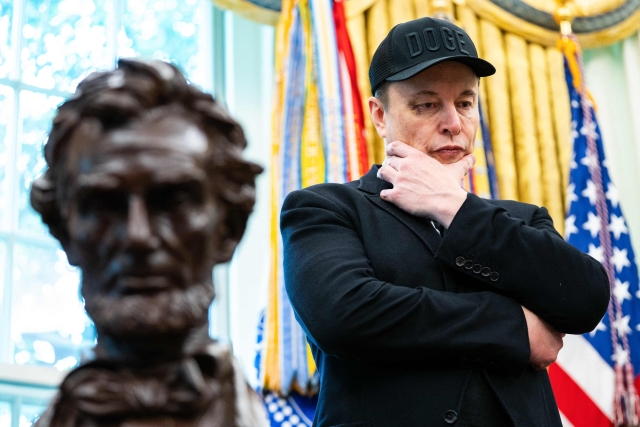
Elon Musk looks on during a news conference with U.S. President Donald Trump in the Oval Office of the White House in Washington, D.C., on May 30, 2025. (Photo: CFP)
Billionaire Elon Musk's announcement that he is forming a new political party—dubbed the "America Party"—has spotlighted mounting dissatisfaction with the U.S. political establishment.
While the timing and tone of the move are characteristically dramatic, the chances of the world's richest man successfully challenging a two-party system that has dominated American politics for more than 160 years remain, at best, slim.
The announcement followed Musk's latest fallout with U.S. President Donald Trump, whom he had previously supported as a major campaign donor and close adviser.
Musk's criticism of Trump's "big beautiful bill" triggered a public rift between the two in June. Although the feud appeared to cool when Musk expressed regret and deleted his most incendiary posts, tensions reignited as the bill neared passage.
Musk had warned he would launch a new party if the legislation became law. On July 5—just one day after Trump signed it—he followed through on that threat.
"Today, the America Party is formed to give you back your freedom," Musk posted on his social media platform, X, accusing both Republicans and Democrats of steering the country toward "debt slavery."
He argued that the U.S. is effectively a "one-party system," where partisan labels conceal the same cycle of wasteful spending and entrenched interests.
Trump dismissed the idea outright.
"I think it's ridiculous to start a third party. We have tremendous success with the Republican Party," the president said on July 6, speaking to reporters before boarding Air Force One in New Jersey. "The Democrats have lost their way, but it's always been a two-party system, and I think starting a third party just adds to confusion."
Legal barriers and financial limits
Trump may have good reason to be dismissive. Third-party movements in the U.S. face steep legal, political, and logistical obstacles—challenges far more complex than building a new company.
Alan Abramowitz, a political science professor at Emory University, has pointed out that the U.S. political system is effectively designed to prevent third parties from succeeding.
Establishing a viable party requires navigating a complex web of federal and state regulations. Ballot access rules vary by state, such as requiring a certain number of signatures. Registering with the Federal Election Commission (FEC) is another step. And federal contribution limits—currently capped at under $450,000 for all party functions combined—mean even someone with Musk's fortune cannot legally fund a national party the way he would a private enterprise.
Former FEC chair Bradley Smith noted that while Musk can pour unlimited funds into a super political action committee (PAC) to support specific candidates, "you can't fund a political party, as a strange part of American law."
Still, Musk's America PAC could play a disruptive role in the 2026 midterms by promoting independent candidates or pressuring incumbents. However, his political ambitions are already rattling markets and allies.
Tesla shares fell sharply during Musk's last fallout with Trump. Azoria Partners, a major investment firm, announced it was postponing the listing of a Tesla exchange-traded fund, citing concerns about Musk's divided focus.
Trump has responded in kind, threatening to reconsider federal contracts awarded to Musk's companies. He also described the Department of Government Efficiency—once led by Musk—as a monster that may
"go back and eat Elon."
"More megaphone than movement"
Musk's timing may reflect broader discontent. Polls from Gallup and UK-based YouGov show support for political alternatives is at its highest level in two decades.
In a recent online poll hosted by Musk himself, more than 65% of respondents said they supported forming a new party. However, experts caution that social media enthusiasm rarely translates into votes or viable candidacies.
U.S. history offers a reality check. Billionaire Ross Perot garnered nearly 20% of the popular vote in 1992 but failed to carry a single state. Third parties like the Libertarian and Green parties have never gained meaningful traction at the federal level.
Still, the America Party could play a spoiler role. Analysts say even a handful of strategically placed campaigns could split the Republican vote and cost Trump-aligned candidates key seats—a shift that could alter the political calculus in close races.
Su Xiaohui, deputy director of the Department for American Studies at the China Institute of International Studies, noted that while Musk may not reshape the system, his influence could be enough to inflict political damage on Trump and the GOP.
Su added that for now, the America Party is likely to remain more of a protest vehicle than a viable political alternative. Its impact could be real but limited—more megaphone than movement.
Reporter | Liu Xiaodi
Editor | Yuan Zixiang, James, Shen He

















